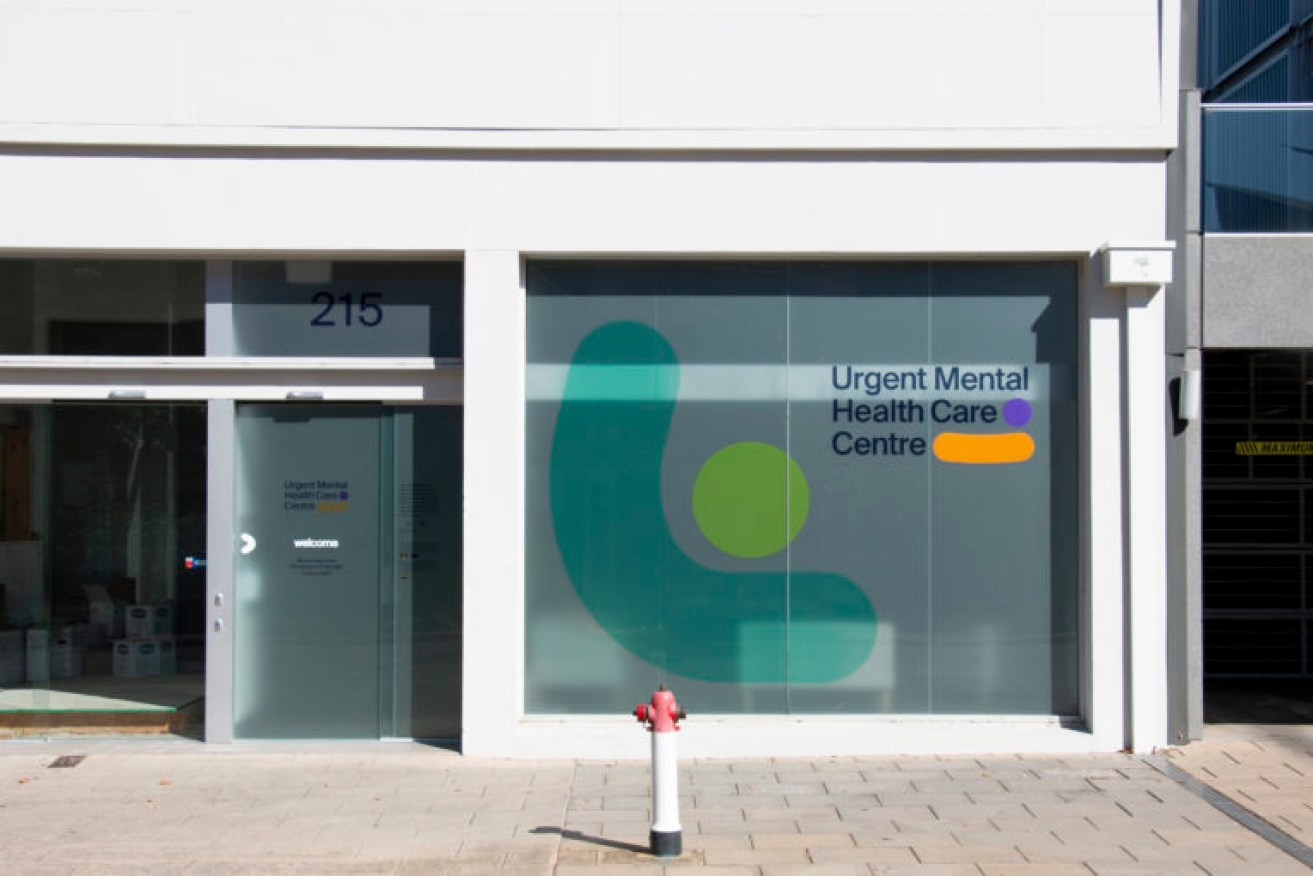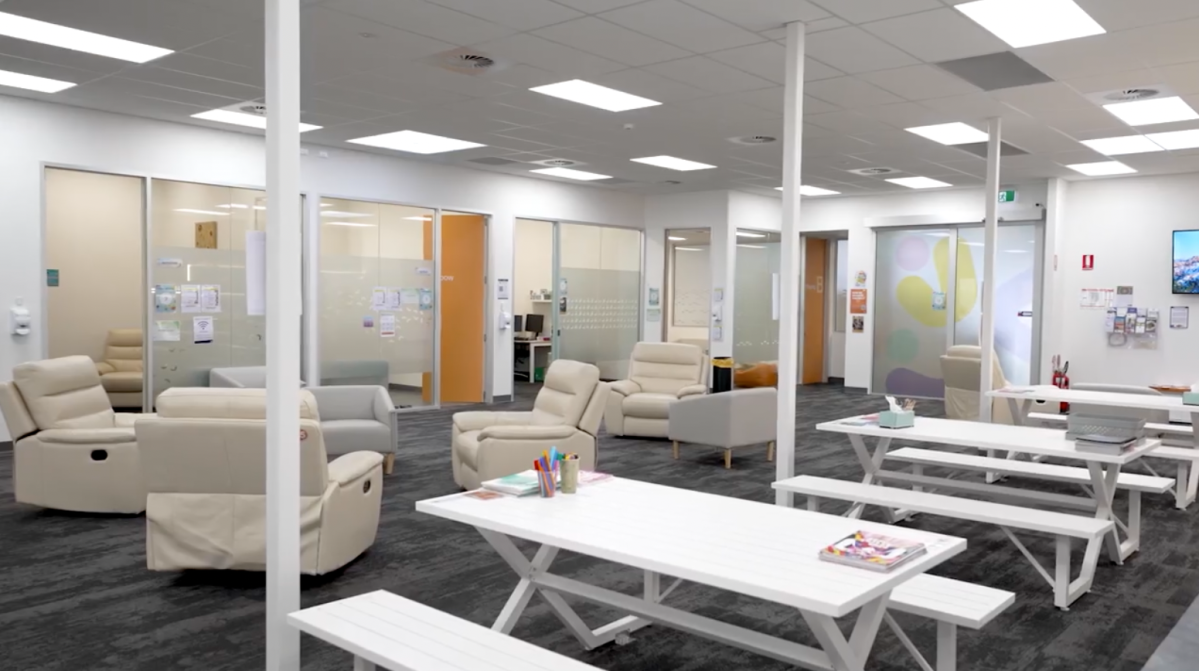Jump in demand for city’s Urgent Mental Health Centre
An urgent mental health care centre in the CBD has recorded a 12 per cent increase in demand in six months, with data showing the service has helped ease pressure on hospital emergency departments.

The Urgent Mental Health Care Centre on Grenfell Street. Photo: Angela Skujins/CityMag
Described as a “first of its kind” service when it opened in March 2021, the $14 million Urgent Mental Health Care Centre (UMHCC) on Grenfell Street has so far supported more than 6500 people experiencing a mental health crisis.
The state and federal government-funded service is delivered by not-for-profit Neami National and offers individuals and families, as well as police and ambulance officers on callouts, an alternative to presenting at hospital emergency departments.
Those aged over 16 experiencing mental health distress or crisis can walk-in to the centre at any time to receive free support in a calm “living room” environment.
Neami SA state manager Helene Nielsen told InDaily that over the past six months the UMHCC had experienced a 12 per cent increase in the number of visitors, with 420 visitors in January alone.
She said women aged 20-29 were amongst the centre’s most common visitors, with many presenting with generalised or ongoing suicidal ideation, anxiety and/or depression.
“We think this steady increase in consumers is largely due to the accessibility of our service,” she said.
“No referral is required to access support, which helps to ease the pressure on hospital emergency departments.
“We are a team of clinical staff and peer support workers with lived experience of mental health recovery who provide a different perspective and unique understanding of what consumers might be going through.”

Inside the Urgent Mental Health Care Centre on Grenfell Street. Photo: Neami National/Facebook
When it opened in 2021, former Marshall Government Health Minister Stephen Wade claimed the UMHCC would reduce pressure on hospital emergency departments and improve patient flow, particularly at the Royal Adelaide Hospital.
Nielsen said in January this year alone, at least 22 per cent of visitors to the centre had been diverted directly from hospital emergency departments.
She said that figure was a minimum estimate and that anecdotally, staff believed the number could be higher.
“It is also great to see that an average of 85 per cent of people who visit the UHMCC go back to their homes after their visit, with others requiring further immediate physical or mental health support,” she said.
“Guests leave with tools that support them when they return home, links to community supports, follow-up calls in the days following their stay and a safe non-judgemental place to return should a mental health crisis present or re-present.”
The UMHCC was initially funded by the former Morrison and Marshall Governments as part of a trial.
Neami National and the state government say the UMHCC is funded until June 2024, while the federal government claims funding runs until June 2026.
A spokesperson from the federal Health Department said the UMHCC formed part of a national network of “Head to Health” services being rolled out across the country, with two new “Head to Health” centres and two new “Head to Health satellites” planned for South Australia.
They said “Head to Health” services provide immediate support and follow-up for people presenting in crisis, and short to medium care for people with moderate to severe levels of mental illness.
SA Health Minister Chris Picton said he wanted to see more people using the UMHCC to help keep pressure off emergency departments.
“There’s no doubt that if we can provide care for people who need mental health care in alternative settings then that can be a good outcome for the person, and for the health system overall,” he said.
“There are many people who don’t need to be in a busy, noisy emergency department who can have a better outcome elsewhere such as the Urgent Mental Health Care Centre.”
Picton said there had been a “substantial investment” from the federal and state governments in the UMHCC and they were working to increase awareness of the service.
“In addition, the Malinauskas Government late last year opened a new northern suburbs drop-in mental health service – ‘Safe Haven’ based at Salisbury,” he said.
“There are also plans for more urgent mental health services to open in the future.
“This includes the future development of a new Head to Health Centre in Mount Barker and a new Crisis Stabilisation Unit in the North East, which will incorporate an Urgent Mental Health Care function as well as crisis beds. These projects are in conjunction with the Commonwealth Government.”
The Australian College for Emergency Medicine’s inaugural “State of Emergency” report found that on average, 75 patients presented with mental health or behavioural problems at South Australian emergency departments per day in 2020-21 – up from 65 in 2016-17.
Patients presenting with mental health and behavioural problems now account for five per cent of all SA emergency department presentations – the highest rate in the country.
“We’ve been advocating for other avenues for people with mental health problems, and certainly better community supports to try and offer alternatives to come to emergency,” the college’s SA faculty chair Dr Michael Edmonds told InDaily in November.
“We know that the emergency department is not the right environment for most people with mental health problems.”




